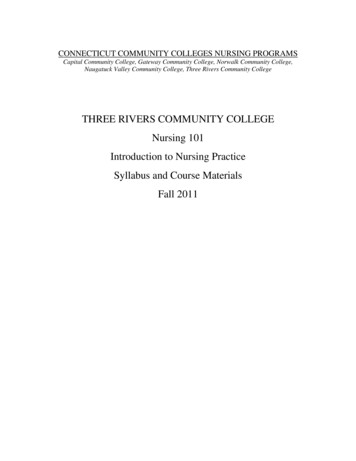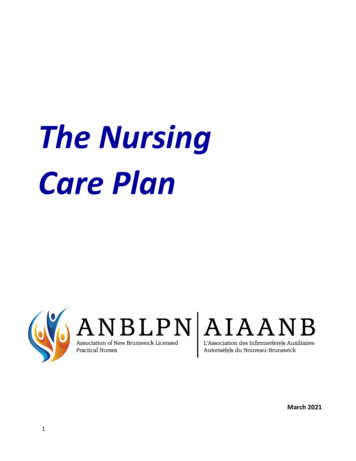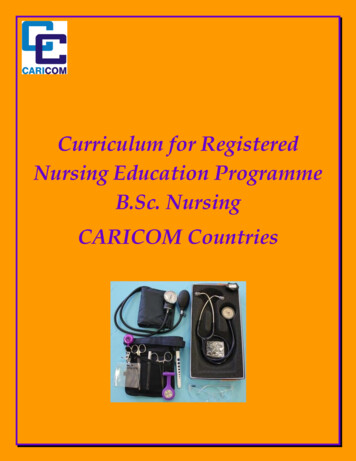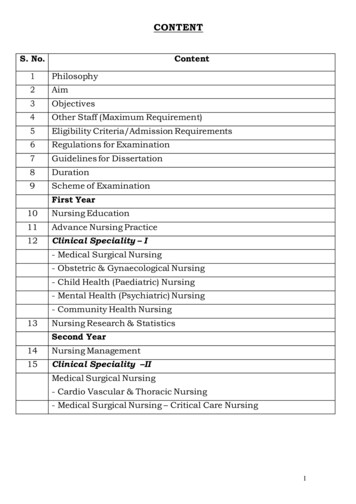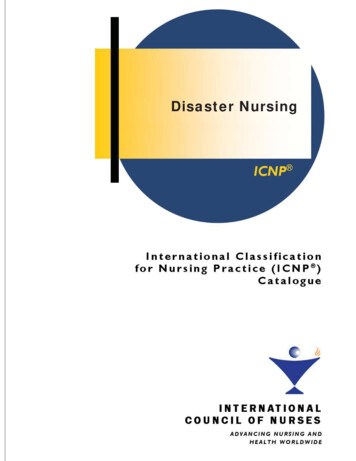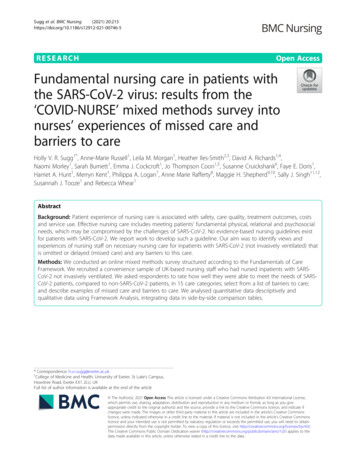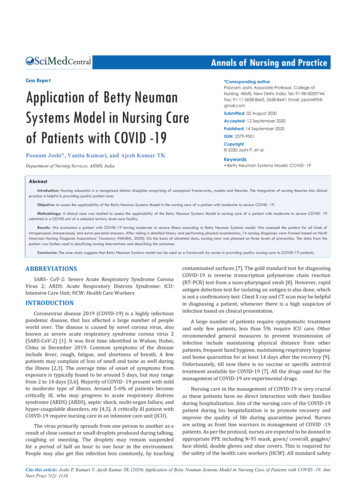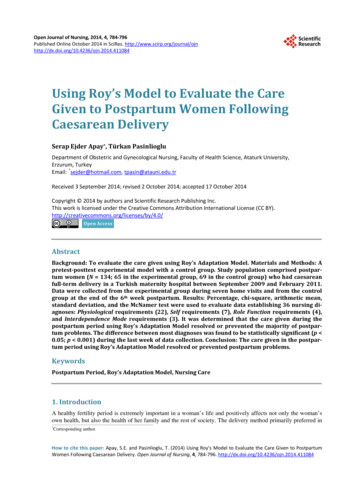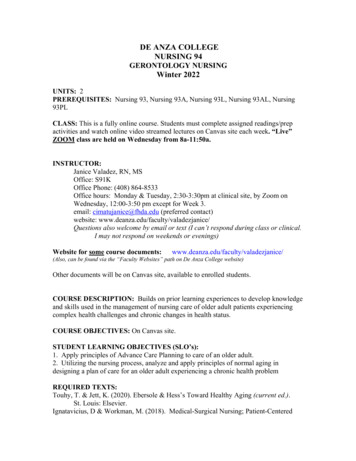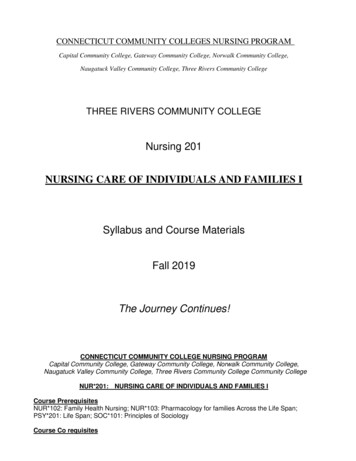
Transcription
CONNECTICUT COMMUNITY COLLEGES NURSING PROGRAMCapital Community College, Gateway Community College, Norwalk Community College,Naugatuck Valley Community College, Three Rivers Community CollegeTHREE RIVERS COMMUNITY COLLEGENursing 201NURSING CARE OF INDIVIDUALS AND FAMILIES ISyllabus and Course MaterialsFall 2019The Journey Continues!CONNECTICUT COMMUNITY COLLEGE NURSING PROGRAMCapital Community College, Gateway Community College, Norwalk Community College,Naugatuck Valley Community College, Three Rivers Community College Community CollegeNUR*201: NURSING CARE OF INDIVIDUALS AND FAMILIES ICourse PrerequisitesNUR*102: Family Health Nursing; NUR*103: Pharmacology for families Across the Life Span;PSY*201: Life Span; SOC*101: Principles of SociologyCourse Co requisites
NUR*202: Pharmacology for Individuals and Families with Intermediate Health Care Needs;ENG*102: English Composition & LiteratureCourse ComponentsCredits9 creditsHoursClassroom: 60 hoursClinical: 225 hoursCourse ScheduleLecture: Tuesdays 8:30-10:30AM and 12:30-2:30PMLabs: 8:30am - 4:00pm Weeks 3, 6, 11, 13Course DescriptionThe student will focus on holistic care of individuals and families across the lifespan with a varietyof health care needs. The needs of clients experiencing endocrine, respiratory, gastrointestinal,cardiovascular conditions and selected mental health disorders are examined. Bioterrorism as ahealth care issue will be addressed. Clinical laboratory experience provides the student anopportunity to administer care to a diverse population of clients in a variety of acute care andcommunity health care settings. The student will utilize critical thinking, caring, professionalismand communication skills in the care of the client. Emphasis is placed on provision of safe andcompetent care and development of the professional role as a member of a multidisciplinary healthcare team. Over the semester, the student is increasingly challenged in the clinical area withmore complex client assignments.Course Student Learning OutcomesAt the completion of this course, the student will be able to:1. 1.Implement principles of holistic care for individuals, families and groups from diversecultures across the wellness-illness continuum. (as measured by CLEW, formative andsummative clinical evaluations, group case studies and care plans, exam questions)2. 2.Analyze multiple variables when implementing the nursing process in the care ofindividuals, families, and groups from diverse populations across the wellness-illnesscontinuum. (as measured by exam questions, CLEW, group case studies and care plans,formative and summative clinical evaluations, simulations)3. 3.Integrate evidence-based practice, quantitative reasoning and technology inproviding competent care to individuals, families, and groups with intermediate healthproblems. (as measured by exam questions, dosage calculation exam, use of technology inlab and in clinical, simulations, evidence based practice clinical assignment, CLEW)4. 4.Utilize therapeutic communication techniques in providing care to individuals,families, and groups with intermediate health problems. (as measured by exam questions,formative and summative evaluations, process recordings, simulations, clinical journals)5. 5.Implement a teaching plan for individuals, families, and groups with learningneeds.(as measured by exam questions, formative and summative evaluations)6. 6.Integrate respect for human dignity through therapeutic relationships withindividuals, families, and colleagues. (as measured by formative and summativeevaluations, simulations)7. 7.Function effectively as a member of the health care team. (as measured by examquestions, formative and summative evaluations, simulations)8. 8.Implement legal and ethical practice standards in providing care to individuals,families and groups with intermediate health problems in diverse health care settings.(asmeasured by exam questions, formative and summative evaluations, simulations)9. 9.Evaluate the professional nursing roles within the health care delivery system. (asmeasured by reflective journals, out rotation assignments)
UNIT OBJECTIVESPlease refer to class outline for unit objectives.Faculty / Staff AvailabilityStudents are encouraged to seek clarification with the course leader as needed. Students are alsoencouraged to seek advisement with faculty as needed. Scheduled faculty office hours are postedoutside faculty offices. Students may also meet with faculty by appointment. All faculty and stafflook forward to your success and practice as a registered nurse. Please utilize your time and oursto develop your abilities to the fullest!Faculty:Full TimeTeri Ashton MSN, RN, CNEtashton@trcc.commnet.edu860-215-9405Office c228Jillian Zupan MSN, RN, CENjzupan@trcc.commnet.edu860-215-9419Office c244Sara Sonstroem MSN, RNssonstroem@trcc.commnet.edu860-215-9438Office C226Melissa Neill MSN, RNmneill@trcc.commnet.edu860-215-9477Office C246Adjunct FacultyLinda Moscaritolo, MSN, RNAmanda Fitzgerald, MSN, RNKaren Anastasiou MSN, RN, CCRNJen LaPerle MSN, RNAndrea Cronin MSN, RNCharlene D’Angelo MSN, RNDirector of Nursing and Allied Health: Edith Ouellet, M.S.N., RNOffice: C245Phone & Voicemail: 860-215-9460Email: eouellet@trcc.commnet.eduNursing Lab StaffDenise Cortegiano, MSN, RN Lab CoordinatorNursing Program College FacilitiesFacilities available to the students are: Faculty offices, the library, nursing classrooms, the nursinglab, the tutoring center, the writing center. These are located on campus. Computer labs arelocated within the nursing lab and throughout the E Wing.Nursing 201 Clinical / Lab ExperiencesAcute care clinical facilities include the following: WW Backus Hospital, Lawrence andMemorial Hospital, Gaylord Hospital and Windham Hospital.Orientation: All groups will attend orientation sessions for the med-surg experience. Times willbe announced as per facility availability.Clinical Observational Learning Activity: Students in good clinical standing will participate inthree to four out-rotations. These will be assigned as specified on your clinical rotation schedule.
Student nurse uniforms and college ID badges are required. Students must attend assignedobservations as scheduled. Observational experiences are part of the required clinical hours andmust be successfully completed to receive satisfactory passing clinical grade. Classroom labs andrequired validations will be presented as noted on course calendar. Uniforms and name tags arerequired for all on campus labs. Attendance is mandatory and counts as clinical time.Clinical Equipment and UniformsStethoscope, Watch with second hand, Bandage Scissors, Black pen, Notepaper, Assigned text,Uniform, ID Badge. Student nurse uniform per Student Nurse Handbook and identification, i.e.College name tag and/or hospital ID badge, are required for all clinical experiences.Grading PoliciesTo pass Nursing 201 and progress in the nursing program, a student must do ALL of the following: Earn at least a 74 average in the theoretical portion of the course. Test itemsare drawn from ALL content of the course; theory, lab, clinical and math. Pass the clinical component of the course with satisfactory evaluation in allclinical learning objectives. Pass Dosage Calculation Competency with 90% accuracy. See belowtesting policy. Pass required clinical skills validations. See policy below. Complete required standardized testing as scheduled for the course.The grading schema is as follows:ScoreGrade93-100A90-92A-87-89B 83-86B80-82B-77-79C 74-76C70-73C-67-69D 64-66D60-63D-
60FEvaluation Activities Reviewed: ExaminationsThere are five class examinations each worth 14% of the final grade spread out throughout thesemester. See Quick view calendar. Each exam will be 75 minutes with 40-42 questions. Therewill be 10 pop quizzes scattered throughout the semester which will count for a total of 5%. Theadditional 25% of the grade is based on the two hour final examination which is a cumulative examcontaining between 80 and 85 questions. Bonus points may be added to the final exam basedupon the students Proficiency Level achieved on the Custom Assessment of the standardizedtesting (ATI). Proficiency Level points will be determined by the CT-CCNP Committee prior to thefinal exam.It is expected that all students will be present and punctual for exams. In the event that thestudent will be absent for personal illness, the student must notify the course leader prior to7:45 a.m. on the morning of the exam. Failure to do so may result in a failing grade for thatparticular exam. Planned absences for vacations are not valid reasons for missing an exam. Ifwarranted, one cumulative makeup exam will be offered at the end of the semester. Any studenttaking a make-up exam will have 10 points subtracted from the exam grade unless documentationof extenuating circumstances has been provided to and approved by the course leader.Testing Procedures: The standard time allotment for each exam in the CTCCNP is 60minutes. Students with learning differences requiring accommodations for extra time are usuallyallowed 90 minutes. The nursing faculty has agreed to grant the extra 30 minutes to allstudents. Doors will open at 7:45, and bubble sheets will be available. Exams will start promptly at8:00. Students must be in the testing room and ready to start their exam at that time. Any studentarriving after 8:00 will be admitted at 8:15. Students arriving after 8:15 will not be admitted and willneed to take the make-up exam at the end of the semester. No questions will be answered by theproctors during the exam.Students are required to complete the answer sheet as directed, which includes accurate BannerID number. Students will have 90 minutes to complete exams and 3 hours to complete the finalexam. Students may not leave the exam room for any reason and return to the exam. All books,coats, backpacks, bags, etc. must be left in your car or placed in the front of the exam room. Onlywrist watches with a dial face will be allowed. Eating and/or drinking are not permitted duringexams. Students may not wear hats during exams. Calculators will be provided by the school.Wooden #2 lead pencils are to be used, no mechanical pencils. Anyone who looks at anotherstudent’s exam or who is seen talking either to themselves or to someone else during the exammay receive an exam grade of 0. Exam scores will be posted on Blackboard no later than 48 hoursafter the exam.Students will be required to pass a dosage calculation exam with a grade of 90% or above.Calculators will be provided. The student will have three attempts to pass the exam. Ifunsuccessful, the student will need to go to the lab for remediation prior to rescheduling the nextattempt with the course leader. The next exam must be scheduled at least one week from the mostrecent unsuccessful attempt. If the student is not successful on the third attempt, the student willbe given the opportunity to withdraw. If the student chooses not to withdraw, a failing grade will begiven for the course. The student will be given the opportunity to apply for readmission.Med calculation rounding rules: IV, IM and Infusion rates (any medication from a vial), should be rounded to the 10th(For example: 22.3, 27.6, 35.1) Infants: should be rounded to the 100th place Do not round UNTIL your final product/answer.
Skills Validations: Students in this semester will complete skills validations during lab #2.Students are strongly advised to practice the required skills in the lab prior to validation day. Astudent who is unsuccessful in validating must complete a lab referral remediating the skill with inone week, practice in the nursing lab, and then schedule an appointment with the lab to revalidate.If the student is unsuccessful a second time, the student must once again remediate the skillbefore making an appointment with the course leader to attempt a third time to validate. If thestudent is not successful a third time, the student will be given the opportunity to withdraw. If thestudent chooses not to with draw, a failing grade will be given for the course. The student will begiven the opportunity to apply for readmission.Exam Review: Students may review concepts from the most recent exam with the lab staff.There is no longer mandatory individual lab review for a failing exam grade. Students who receivea failing exam grade are required to meet with the course leader prior to the next exam.Clinical Evaluation Activities:Clinical performance is evaluated on the basis of how well the learner meets the objectives andachievements identified on the N201 formative clinical evaluation form. Students must successfullymeet the clinical objectives in order to pass the course. Clinical instructors will complete a weeklywritten formative evaluation of clinical performance, and will meet weekly with students to reviewstudent progress. A summative evaluation will be completed and reviewed at the end of thesemester.See CT-CCNP Student Handbook for information regarding the clinical evaluation process.Clinical Absenteeism Policy:The student who is absent for one clinical day will receive a CPIP. A second clinical absence willresult in the student being placed on clinical warning. To be successful in the course, the studentmust earn removal from clinical warning status by having no further clinical absences theremainder of the semester.If the student has more than 2 absences, the student will not be able to meet the clinical objectivesresulting in a clinical failure, thereby, failing the course (please see the student nursing handbook).Extenuating circumstances will be reviewed by the nursing faculty and the director of nursing.If there are greater than one absence in a specialty area, the student will be unable to meet theclinical and course objectives resulting in a clinical failure, thereby, failing the course. Extenuatingcircumstances will be reviewed by the nursing faculty and the director of nursing.Standardized Curricular Testing: Standardized testing is required in order to pass this course.Please check the quick calendar for dates and times. Students have the opportunity to earn up tothree performance points which are added to the final exam grade.75% & above Score on NUR*201 CA*70% - 74.9% Score on NUR*201 CA*60% - 69.9% Score on NUR*201 CA*59.9% & below Score on NUR*201 CA*3 points2 points1 point0Electronic portfolio- All students are required to maintain an online learning portfolio in Digicationthat uses the college template. There will be one assignment during the course of the semesterthat will need to be uploaded into Digication. Completion of this assignment is a courserequirement, and failure to complete it may result in an incomplete for the course. This assignmentmay be used by the general education assessment team on campus to measure collegeoutcomes, and improve student experiences. There will be no identifying data on this assignmentto link it to a particular student. You are encouraged to use the digication platform to reflect on,demonstrate, or showcase your growth throughout your time as a nursing student. Your portfoliowill be private unless you choose to share it.
Course Communication: Communication in N201 is done exclusively through Blackboard learnmessaging or using your SCHOOL email. It is important that you get in the habit of checkingblackboard daily, as you will be held responsible for communications sent to you.Student Success in N201Study GroupsStudy groups are crucial to your N201 success. It is recommended that studentsparticipate in study groups. Study groups have been shown to promote student success.When you decide to join a study group, choose a group with students that are doing welland want to work hard. This may/may not be your immediate group of friends. For tips onmaking the most of study groups see the Blackboard posting on Tools for Success. Thenursing lab has some space available to meet, as does the library. Staff within the nursinglab are available during posted hours to assist students with tutoring, skills, study/test takingskills, or other learning needs. Students are encouraged to be proactive in their learningand seek help independently. Learning resources can be found on the N201 Course Shellon Blackboard, Text book Web Sites and CDs / DVDs, materials within the nursinglaboratory and library, and the ATI website. Students are encouraged to utilize theseindependent opportunities frequently.Methods of InstructionTeaching modalities include lecture, power point, case studies, group activities, I-clickers,and simulation. Computerized programmed instruction and interactive learning tools may beused as well. Blackboard and Digication are N201’s learning management tools. Studentsare encouraged to participate in all activities offered to enhance the learning experience.Students are expected to participate in class discussions, class activities, role-play, examreview, lab practice, and simulations. Participation enhances the learning experience andallows students and instructors the opportunity to learn from each other. Students arestrongly encouraged to attend all classes. Tardiness, early departure, and absences have adirect impact on student learning.Nursing Lab ResourcesThe Nursing lab is available for all students. The lab staff offer a wide variety of services tohelp students succeed. Students may be referred to the lab for tutoring, math skills,clinical skills, organization and time management, study strategies and test takingstrategies. However, students do not need to be referred to get the benefit of all servicesthe lab has to offer. Students who frequently use the lab find it to be a powerful tool forsuccess.Professionalism: The TRCC nursing handbook states “Professionalism is acquired through acomplex process by which the nursing student internalizes values inherent to the practice ofnursing. These values include integrity, legal-ethical standards, confidentiality, political awareness,and collegiality.” Professionalism is more than clinical excellence. It is leadership. It isdemonstrating nursing ethics and values in one’s words, and in one’s behaviors. Students will beheld accountable to professional standards of behavior in the classroom, clinical, the nursing lab,and on social media.Classroom and clinical demeanor is a vital part of professionalism. Students should behaverespectfully at all times, recognizing each person's right to learn in an atmosphere conducive to thelearning experience.Do:Be honest.Have a positive attitude.Be prompt, and be prepared.
Strive to be a positive, active member in class group work, as well as in clinical aspart of the health care team.Avoid side bar conversations.Listen when others are speaking.Avoid negative body language such as eye rolling, loud sighs, smirking.Keep cell phones turned off unless using them for class.Speak respectfully to peers, instructors, patients, family, and health team members.Refrain from gossip/complaining regarding peers, instructors, facilities, staff, andpatients (HIPPA).Refrain from social networking regarding peers, instructors, facilities, staff, andpatients. (See social network policy)Students who violate the guidelines of courtesy and/or professional demeanor will be asked toleave the setting, and will need to complete a performance improvement plan with remediation.Nursing health and background check requirements: As per the Castlbranch ePortal(https://www.castlebranch.com), students who are non-compliant with health requirements,background checks, drug screening and CPR at any time, will be required to leave the programimmediately. The student may request readmission if eligible in accordance with the CT-CCNPstudent readmission standards.Required Textbooks: (textbooks are used in prior/subsequent courses)1. 1.Potter, P, & Perry, A, (2017) Fundamentals of nursing, Enhanced multimediaedition. (9h ed) St Louis MI: Mosby/Elsevier. 978-0-323-08867-12. 2.Potter P, & Perry A. (2018) Clinical nursing skills and techniques (9h edition) StLouis MI: Mosby/Elsevier 97803230793343. 3.Ackley, B. J.& Ladwig (2010) Nursing diagnosis handbook (11th edition) Philidelphia:Saunders4. 4.Lewis, S.L., Dirksen, S.R., McLean Heitkemper, M. Bucher, L., & Camera, I.M.(2017), Medical-surgical nursing. Assessmant and management of clinical problems (10thed), St Louis: Elsevier Mosby. ISBN 978-0-323-10089-2Vallerand, Davis’s Drug Guide for Nurses, 15th edition, ISBN9780803657052-Required5. 5.6. 6.Pickar,G. D. & Abernathy A. B. (2013) Dosage calculations, with CD, (9th edition)Clifton Park NY: Delmar Publications, 97811337072717. 7.VanLeeuwen, A. M. & Poellhuis-Leth, D. J. (2016), Davis’s comprehensivehandbook of laboratory and diagnostic tests with nursing implications. Philadelpjia: .F. A.Davis8. 8.Hockenberry, M.J., & Wilson, D. (2016) Wong’s essentials of pediatric nursing (10thed.)St Louis: Mosby Elsevier9. 9.Varcarolis, E. M. Carson, V. B, & Shoemaker, M. C. (2013). Foundations ofpsychiatric mental health nursing (8th) Philadelphia: W.B. Saunders10. 10.Pharm Made Easy online ATI course access- please contact course leader for this.
New books for this course1. 11.Sole M. L., Lamborn and Hartshorn, (2017). Introduction to critical care nursing,(7th ed,) 978-0-323-37703-4Optional:1. 12.Lehne, R. A. (2016) Pharmacology for nursing care, with CD (9th edition) St LouisMI: Elsevier ISBN 978-1-4160-6249-32. 13.Dillon, Patricia, Nursing health assessment: Clinical pocket guide, Philadelphia: F.A. Davis.3. 14.Sommers M. S., & Johnson, S. A. Diseases & disorders: A nursing therapeuticsmanual (5th ed.) Philadelphia: F.A. Davis.Additional InformationNursing Student HandbookThe Connecticut Community College Nursing Program (CT-CCNP) Nursing Student Handbookcontains the program specific policies and procedures in effect for academic year 2018-2019. It isthe student’s responsibility to be familiar with the content in the Nursing Student Handbook. Thestudent will be held accountable for meeting the expectations outlined in the Nursing StudentHandbook, College Catalog, and College Student Handbook. The CT-CCNP reserves the right tomodify any information contained in the Nursing Student Handbook. Officially approved changeswill be made known to students through a Nursing Student Handbook Addendum.Refer to the Nursing Student Handbook for detailed information regarding:- Missed Exams- Clinical Evaluations- Clinical Warning- College Labs- Attendance- Required Clinical Equipment- Professional Appearance in the Clinical Sites- Return after withdrawal- Inability to return under certain circumstancesThree Rivers Community College Student HandbookRefer to the TRCC Student Handbook regarding Disabilities, Course Refunds, Withdrawal Dates,Financial Aide and other college specific policies and resources.WITHDRAWAL POLICY:Students may withdraw, in writing, at the Registrar's Office for any reason. Refer to the Nursingand College Student Handbooks and College Catalog. Students who receive an overallunsatisfactory clinical grade at any time in the rotation will fail this course and receive a grade ofF. Course grades are posted on Blackboard at all times, including a current average. Studentswith concerns about their course average are encouraged to contact the course leader.DISABILITIES STATEMENT:If you have a hidden or visible disability which may require classroom or test-taking modifications,please see the Disability coordinator as soon as possible. Contact Counseling and DisabilitiesServices (860-215-9017 if you have a learning disability or are looking for information regarding apossible learning disability. Contact student services (860-215-9016) for other physicaldisabilities. Please see the Three Rivers Community College Catalog for additional policies andinformation.
COUNSELINGStudent counseling is available at no charge to the student. If you are having trouble, please notifyyour course leader and/or visit the counselors in the student services area. You can call thecounseling center directly at 860-215-9017. They can help with career counseling, personalcounseling, transfer issues, financial issues, community service needs etc.CLINICAL CANCELLATION DUE TO INCLEMENT WEATHER:When the college is closed for reasons of inclement weather, clinical experiences will also becanceled. When the college delays opening, clinical experiences will begin one hourlater. However, students should use discretion in traveling in poor weather conditions. If youare unable to report to scheduled clinical experiences, be sure to notify your clinicalinstructor. Preplanning and communication with your clinical instructor and course coordinator isimportant. Your clinical instructor will guide you to the most appropriate way to communicate withhim/her. The College Student Handbook and Catalog lists radio stations announcing cancellations.Information will be posted on the college website regarding college closure/delay.www.trcc.commnet.edu.In addition, myCommNet Alert is a system that sends text messages and emails to anyone signedup in the event of a campus emergency. TRCC also sends messages when the college is delayedor closed due to weather. You can sign up for myCommNet Alert on your mycommnet portal.INDIVIDUALIZED LEARNING NEEDS: The student has the option of choosing which method ofstudying or combination of methods is most suitable for his/her learning needs. Faculty mayrequest completion of additional learning activities as indicated by student needs. Extra practicesessions can be planned in the laboratory upon request. Study groups can be formed. Additionalreading materials can be suggested. Audio and visual tapes and computerized materials onseveral patient situations are available. At the discretion of the faculty team, individual studentclinical rotations maybe re-sequenced to facilitate student learning.ACADEMIC INTEGRITY:“Academic integrity is essential to a useful education. Failure to act with academic integrityseverely limits a person’s ability to succeed in the classroom and beyond. Furthermore, academicdishonesty erodes the legitimacy of every degree awarded by the College. In this class and in thecourse of your academic career, present only your own best work; clearly document the sources ofthe material you used from others; and act at all times with honor.” See TRCC Student Handbook.A student's written work is expected to be original and done independently unless otherwiseindicated. Footnotes and references must be used to acknowledge the source and avoidplagiarism.Selected portions of the nursing curriculum are taught, reinforced, or reviewed through the use ofeducational software/instructional media: e.g., audiovisual media, computer programs, onlinelearning activities etc. Students must sign an Ethics Statement regarding the use of these materialsand agree to follow the policies outlined in the Statement. The signed Ethics Statement is retainedin each student's record.Violations of academic integrity will be referred to the Academic Dean and dealt with in accordancewith the college policy on Academic Integrity.See Nursing Student HandbookStatement on penalty for academic dishonesty or plagiarism:Plagiarism is the unacknowledged use of another person’s words or ideas in your writing. Whetherconscious or not, plagiarism is a serious offense. Evidence that you did not write material that yousubmit under your name can result in failure for the entire course. Refer to College Catalog forpolicy. Students are expected to:Demonstrate academic integrity by not engaging in conduct that has as its intent or effect the falserepresentation of a student’s academic performance, including but not limited to : (a) cheating onan examination; (b) collaborating with others in work to be presented, contrary to the stated rules of
the course; (c) plagiarizing, including the submission of others’ ideas or papers (whetherpurchased, borrowed, or otherwise obtained) as one’s own; (d) stealing or having unauthorizedaccess to examination or course materials; (e) falsifying records or laboratory or other data; (f)submitting, if contrary to the rules of a course, work previously presented in another course; and(g) knowingly assisting another student in any of the above, including an arrangement whereby anywork, classroom performance, examination, or other activity is submitted or performed by a personother than the student under whose name the work is submitted or performed. Consequences arespecified in the Nursing Student Handbook.Statement of Policy for Public Act No. 14-11: An Act Concerning Sexual Assault, Stalkingand Intimate Partner Violence on Campus:“The Board of Regents for Higher Education (BOR) in conjunction with the Connecticut StateColleges and Universities (CSCU) is committed to insuring that each member of every BORgoverned college and university community has the opportunity to participate fully in the process ofeducation free from acts of sexual misconduct, intimate partner violence and stalking. It is theintent of the BOR and each of its colleges or universities to provide safety, privacy and support tovictims of sexual misconduct and intimate partner violence.”UNITED STATES DEPARTMENT OF EDUCATION AND OFFICE OF CIVIL RIGHTS TITLE IXSTATEMENT OF POLICY:“Title IX of the Education Amendments of 1972 (Title IX) prohibits discrimination based on sex ineducation programs and activities in federally funded schools at all levels. If any part of a schooldistrict or college receives any Federal funds for any purpose, all of the operations of the district orcollege are covered by Title IX.Title IX protects students, employees, applicants for admission and employment, and otherpersons from all forms of sex discrimination, including discrimination based on gender identity orfailure to conform to stereotypical notions of masculinity or femininity. All students (as well a
THREE RIVERS COMMUNITY COLLEGE Nursing 201 NURSING CARE OF INDIVIDUALS AND FAMILIES I Syllabus and Course Materials Fall 2019 The Journey Continues! CONNECTICUT COMMUNITY COLLEGE NURSING PROGRAM Capital Community College, Gateway Community College, Norwalk Community College, Naugatuck Valley Community College, Three Rivers Community College .


